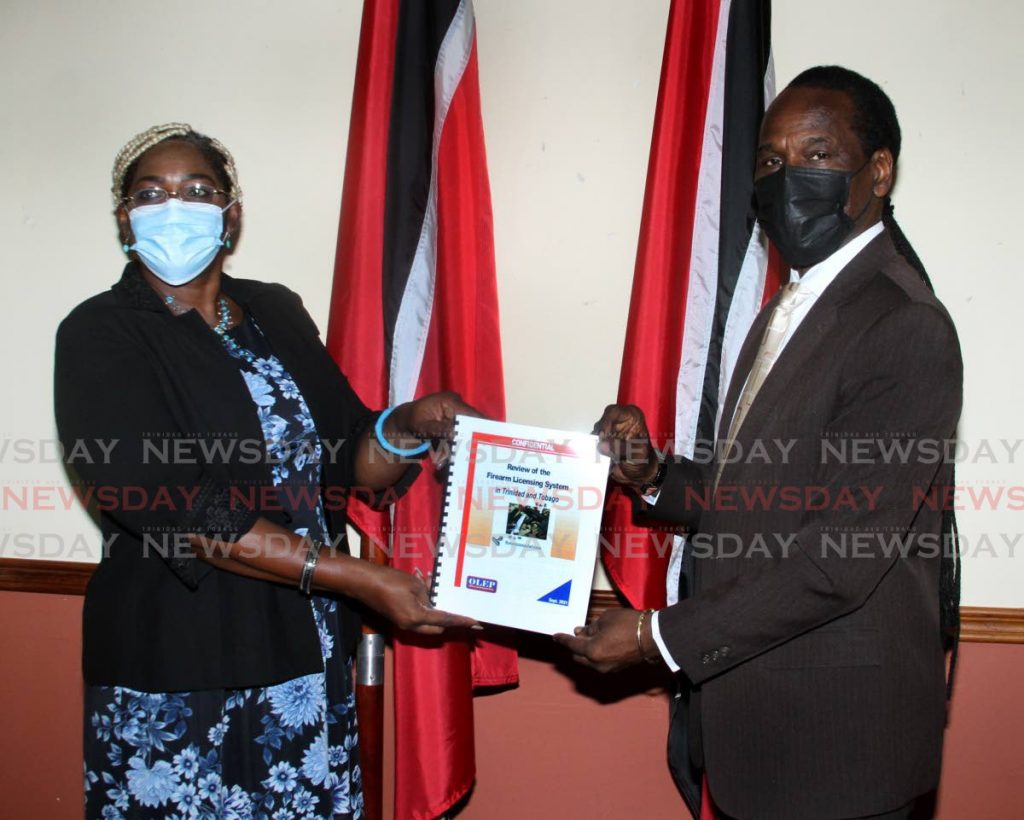Policy head: 'Gun report could restore public trust'

THE head of policy in the Ministry of National Security has suggested this country has too many unaccounted-for guns and said a new system for approving legal firearms was now needed to restore public confidence and for democracy to prevail.
Gale Charles head of the ministry's Office of Law Enforcement Policy (OLEP), was speaking to reporters on Tuesday at the ministry, at the International Waterfront Centre, Port of Spain.
She presented a report to Minister of National Security Fitzgerald Hinds.
Public trust can be restored by a new firearm licensing system, she said.
The report, Review of the Firearms Licensing System in Trinidad and Tobago, will be reviewed by Hinds, sent to Cabinet for the input of ministers and then made public.
Hinds noted OLEP's 2001 report on penal reform, advocating restorative, not retributive justice.
He hoped the firearm report would guide the police in handling the gun licensing regime as he noted the illegal variety had caused "tremendous trauma and pain and stress."
Charles said Hinds had asked OLEP to evaluate the licensing system.
"Today OLEP is pleased to have produced this comprehensive report, which provides innovative policy recommendations for a system that requires substantial overhaul."
She added, "It is no secret that the firearm licensing system in TT has become the subject of intense scrutiny, unbecoming allegations and public distrust.
"For democracy to operate effectively and the interest of the people to be impartially served without fear or favour, it has become necessary for swift and decisive intervention to restore confidence in one of our public institutions."
Charles said critics had said the proliferation of small arms in developing countries has caused a vast loss of life, as the greatest threat to human safety, security and development.
"For my colleagues and I who worked in the national security arena, the firearm which is lost, stolen, trafficked into the country, or diverted from a bona-fide source, represents a disturbing phenomenon that is becoming far too prevalent for comfort. As the former commissioner of police and others have stressed time and time (again), a single firearm with sufficient ammunition has an infinite capacity to cause death and suffering."
In TT, she said, "Where the preferred choice of weapon is the firearm, we have seen lives of individuals and families lost and destroyed due to malicious, negligent or illicit use."
Saying this position was based on empirical evidence she said international and regional agencies such as Caricom IMPACS and the Small Arms Survey have all produced publications which clearly said gun crime was "a significant obstacle to societal development and peace."
Charles listed some factors considered in the report.
"Do citizens of TT have a constitutional right to carry firearms, or is it a privilege? Does the quantity, calibre and type of weapon granted to an individual matter?
"Is the current system fair, transparent and equitable?"
Charles said on top of such current issues, OLEP also had to consider deeper, longer-term and more complex issues.
"How many firearms have been imported into TT and for what purpose? Can local authorities determine if every imported firearm has been properly registered?
"Given the prevalence of gun-related crime in this country, is a restrictive or permissive system more appropriate?"
She asked if the procedure for importing guns was adequate and the requirements to be an importer or dealer were rigorous enough.
"Are individuals who posses multiple firearms sufficiently accountable for their storage, usage and disposal? How do we prevent and detect illicit transfer, false declarations and diversions from legitimate sources?"
Charles said to prepare the report, the existing licensing regime was deconstructed and analysed, by comparing it to those of other jurisdictions, by analysing the Firearms Act, by interviewing experts, by reviewing existing documentation and by doing a strengths, weaknesses, opportunities and threat (swot) analysis.
"The proposed system requires legislative amendments, but whichever is selected it is expected to form a much higher degree of efficiency, transparency and accountability."
Acting Commissioner of Police Mc Donald Jacob said the police service executive was pleased with OLEP's work and supported it.
Newsday asked Charles for the flavour of the report, such as liberalisation or restriction of gun ownership, but Hinds stepped in to say, "The flavour we will discover later."


Comments
"Policy head: ‘Gun report could restore public trust’"